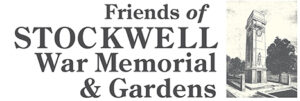The efforts to build a memorial to the men of Stockwell and surrounding areas who lost their lives in the First World War started soon after the war ended, and Stockwell was praised for its energy and decisiveness in opting for a publicly-funded monument that would be handed to Lambeth Borough Council for upkeep. However, the project dragged on because construction was more expensive than anticipated – and the committee inevitably came in for criticism. This piece appeared in the South London Press on 17 November 1921.
SOUTH LONDON PRESS
17 November 1921
STOCKWELL WAR MEMORIAL.
Chairman of the Committee Replies to “Uncalled-for Statements.”
The Stockwell War Memorial is now approaching completion, and as reported on page 4 of this issue, Lambeth Borough Council has decided to lay out the site on which the memorial stands, so that the public will have the benefit of a very fine monument, but also an open space suitably laid out to beautify the neighbourhood.
Mr. Wallace M. Young (Chairman of the Executive Committee), in a letter to the Editor of the “South London Press” states that apart from the Borough Council’s expenditure, there is still about 600 required for the Memorial itself, and he makes an appeal for donations, large and small. The committee are anxious there should be no debts at the unveiling ceremony, the date of which will be announced very shortly. Mr Young proceeds to point out that the committee are always willing to receive fair criticism, but consider that some of the statements made by borough councillors, who are opposed to the scheme, at the debate on February 9, are quite uncalled-for. “For instance, Alderman Bostock wanted to know if any of the committee had an interest in the contract and future winding of the clock. To this I can answer emphatically “No”. Another councillor stated that the memorial would never be completed or paid for. He probably is not aware that all contractors required to know where the money is to come from before signing a contract, as was the case of the builder of the monument. The committee have therefore made themselves responsible for the money.”
The committee now hope that a benefactor will come forward and relieve them of a difficulty which has arisen with regard to providing the clock as the committee had not seen fit to accept a previous offer of a clock owing to the donor intimating that he would require his firm’s name on each of the dials. The committee feel that anything upon the memorial in the nature of an advertisement would be distasteful to the subscribers.
© South London Press
